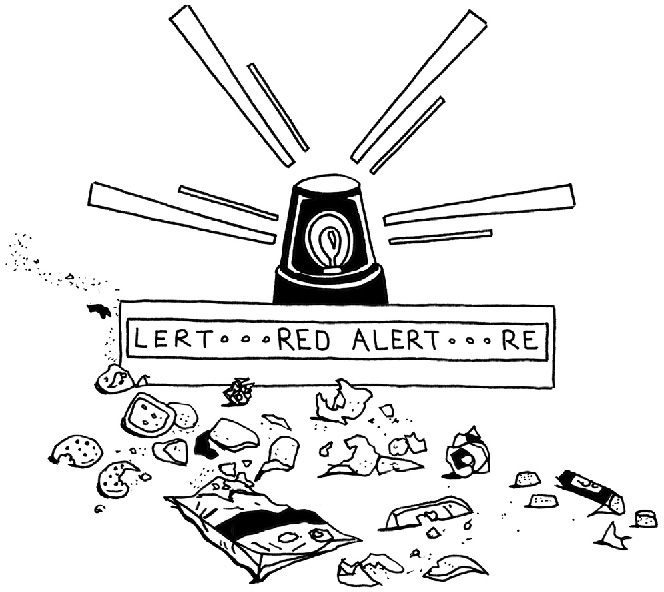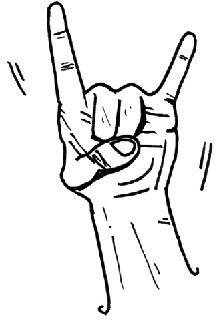

HACKING▶
Minutes after the NHS was cyber-attacked, GCHQ tweeted a poem about how good they are at protecting Britain from cyber-attacks.
The poem was as badly written as it was badly timed:
We’re an intelligence agency known as GCHQ.
Carrying on our mission from Bletchley in World War 2.
Based in Cheltenham, Manchester, Scarborough and Bude.
We work against cyber threats, terrorists and those up to no good.
Because keeping Britain safe is what we do.
The NHS hack was stopped when a computer expert, 22-year-old Marcus Hutchins, inadvertently activated the ‘kill switch’ in the software. Hutchins was once suspended from school for allegedly hacking into the computer network (an accusation he denies). As a result he was made to take his IT GCSE with a pen and paper. He failed.*
GCHQ isn’t the only intelligence agency to be caught off guard by hackers. In June, it emerged that a few years back America’s CIA suffered a hack within their own building, carried out by their own contracted personnel. At risk, though, were not the country’s secrets, but the CIA’s snacks. Apparently the hackers had managed to hack their way into one of the building’s vending machines and then proceeded to steal more than $3,000 worth of snacks over a period of six months. When they were finally caught, all those responsible handed in their badges.

HEATWAVES▶
Britain battled a heatwave by sending gritters on to the roads.
The UK suffered its hottest June day in 40 years, as the temperature at Heathrow Airport reached 34.5°C. And for the first time since 1995, the mercury hit 30°C for five consecutive days. Exeter schoolboys and bus drivers in France (where temperatures also soared) both protested against a ban on shorts by going to work and school in skirts, and in Cambridgeshire winter service vehicles were sent out to grit the roads, but on this occasion to stop them melting.
Things were worse still in Arizona and California, where the temperature reached 48°C this year. Flights had to be cancelled, as that’s hotter than the operating temperatures of some planes. After medics warned that touching hot steering wheels in cars might cause burns, people were spotted driving in oven gloves.
In Iran, the mercury hit 54°C. That’s the joint-hottest day anywhere on Earth in recorded history. There was a reported temperature of 57°C in Death Valley in 1913, but most meteorologists now think that it was a mistake, probably caused by someone misreading the thermometer due to the debilitating heat.
Back in Britain, at Royal Ascot horse-racing organisers allowed men to remove their jackets in the Royal Enclosure for the first time ever, and the hashtag #TooHotToSleep trended on Twitter. As Britons melted, and moaned on social media, Australia just laughed. Britain’s 34°C heatwave was colder than the temperature on the same day in the Aussie city of Darwin, where it was the middle of winter.
HELIUM▶
The world suffered a helium shortage, despite a quarter of the universe being made of it.
A third of the world’s supply of helium comes from the tiny country of Qatar, and most of it is driven out, by truck, through Saudi Arabia. So when the Saudis accused Qatar in June of funding terrorism (see Qatar), and closed the border between the two countries, the helium factories were all shut down, and global prices drifted upwards.
Helium is used in everything from party balloons to scuba equipment to MRI scanners to the Large Hadron Collider. Helium balloons’ days may be numbered though. Fifty local authorities in the UK and various towns in America have banned their release because when they pop their remains are a choking hazard to local wildlife. America’s Balloon Council, however, is fighting back. This lobbying group has spent over $1 million in the past five years campaigning to ensure that proposed balloon bans never get off the ground.
For giant sausage-shaped balloons in the Antarctic, see Tunnels.
HERMITS▶
An Austrian town appointed a hermit whose job description includes talking to people.
Divorced ex-artillery officer Stan Vanuytrecht beat 49 other applicants to land the job as a professional hermit in Saalfelden. He was surprised to get the job, saying, ‘I thought I didn’t have a chance.’ According to the town’s mayor, ‘He radiates calm and comes across as well anchored.’ His role will include playing host to people who walk up his mountain to confide in him.
Vanuytrecht’s 350-year-old hermitage is unheated, has no running water and is only habitable from April to November. TV and computers are banned. Because the job is unpaid, applicants were advised to have a private income in place. To apply they had to post a CV, a covering letter and an ‘up-to-date photo’, although it was made clear the winning candidate would be selected more for their personality than their looks or any previous hermit experience. Vanuytrecht said that he was well qualified for the role due to his divorce and the poverty he experienced as a result.
His predecessor lasted only one season in the job, claiming that although he’d met very nice people, he’d been criticised by conservative Catholics for not having a beard. Fortunately, Vanuytrecht, who is Belgian, has a beard. A few months into the job he reported that he was content, saying he always had a glass of schnapps ready for visitors.
Europe has very few professional hermits left. Last year the Swiss city of Solothurn appointed one, a divorced ex-policeman (also bearded) who gets £1,600 a month in salary. He needs social skills, too – in 2014, a previous hermit quit, complaining about the number of tourists who visited him.
One of the only hermits in Britain is Sister Rachel Denton (unbearded), who lives in an end-of-terrace house in Lincolnshire with her chihuahua, Mr Bingley. She makes a living selling greetings cards, explaining, ‘There’s not much call for rush mats and rosaries these days.’ She’s not completely cut off from the world: she likes listening to The Archers and has a website, a Twitter account and two Facebook pages.
HMRC▶
HMRC spends £3,000 a year buying flowers to say sorry for mistakes on people’s tax bills.
The Times revealed that over the last three years, HM Revenue and Customs has spent £8,500 on apologetic bouquets. One went to a café owner in Manchester, who was told she owed the taxman £1 billion. In fact, she owed £17,000. Another recipient was owed a £800 rebate, and instead received a cheque for £1.

In January, HMRC released some of the excuses they’d been given by employers for not paying their staff minimum wage. These included:
▶ ‘It’s part of UK culture not to pay young workers for the first three months as they have to prove their “worth” first.’
▶ ‘She doesn’t deserve the National Minimum Wage because she only makes the teas and sweeps the floors.’
▶ ‘My accountant and I speak a different language – he doesn’t understand me and that’s why he doesn’t pay my workers the correct wages.’
▶ ‘My workers like to think of themselves as being self-employed and the National Minimum Wage doesn’t apply to people who work for themselves.’
▶ ‘My workers are often just on standby when there are no customers in the shop; I only pay them for when they’re actually serving someone.’
HMRC also released a list of the weirdest stuff that people tried to claim as business expenses, including ‘Pet food for a Shih Tzu “guard dog”’, ‘Armani jeans as protective clothing for painter and decorator’ and ‘underwear – for personal use’.
HOLLINGWORTH, CLARE▶
The world said goodbye to the journalist who discovered the Second World War.
Clare Hollingworth (1911–2017) died in January aged 105, 78 years after breaking the biggest news story of all time. She was 27, and had been a foreign correspondent for only four days. On her first assignment, driving on a closed road from Poland into Germany in August 1939, she noticed a series of screens along the side of the road, blocking the view of the valley below. A gust of wind lifted one of them, revealing dozens of Hitler’s tanks preparing for the invasion. The report that she sent back to London wasn’t believed at first, but the Daily Telegraph finally ran it under the headline ‘1,000 tanks massed on Polish border’. A few days later, war broke out.
The Second World War may have been Hollingworth’s greatest scoop, but there were plenty more. In 1963, for example, she broke the story of Soviet spy Kim Philby defecting to the USSR. She kept working, too: aged nearly 80 she climbed a lamp post to get a better look at the Chinese government’s student crackdown in Tiananmen Square. Once, in Romania, she stripped naked to avoid being arrested by security police, reasoning that they would be too embarrassed to dress her by force so that they could lead her away. It worked, and a friend was then able to put a blanket over her and take her to an embassy. She could fly a plane, kept a pearl revolver in her evening bag, and well into her eighties would sleep on the floor every couple of weeks to stay tough.
For more Second World War news from 2017, see Grenades.
HOMO SAPIENS▶
A human from 300,000 years ago would be indistinguishable from one today as long as he wore a hat.

That was one of the two findings that emerged from a study of hominid fossils discovered in Morocco this year. The other was that the textbooks on human evolution would have to be rewritten.
Computer scans showed that the hominids’ faces would have looked like ours. They were relatively flat, and had modern-looking jaws. Only their more elongated braincases would give them away – hence the need for a hat. But what made these relatively modern humans extraordinary was that they were alive 100,000 years earlier than thought possible, and they were found away from the so-called ‘cradle of humankind’ in Ethiopia. This evidence means the perceived wisdom that our ancestors became humans and then spread from Ethiopia can no longer be true. ‘It is not the story of it happening in a rapid way in a “Garden of Eden” somewhere in Africa,’ said Professor Jean-Jacques Hublin, one of the authors of the study. ‘If there was a Garden of Eden, it was all of Africa.’
HORNS▶
Rock star Gene Simmons tried to trademark the ‘horns’ hand gesture.

Simmons, who claimed he made it popular in 1974 during his band Kiss’s Hotter Than Hell tour, submitted an application to the US Patent and Trademark Office along with a sketch of the gesture and a photo of him doing it.
He pulled the application eight days later, after receiving an unexpected backlash from the rock community. They pointed out that:
1. He didn’t invent it – Not only is it centuries old, even its origins in rock and roll can be traced to a former Black Sabbath member’s grandmother.
2. He was patenting the wrong symbol – According to numerous rock and metal magazines, Simmons has been doing the ‘horns’ wrong. By raising his thumb, he’s actually doing an impression of Spiderman shooting his web.
3. It’s probably not registrable – Because what he was inadvertently trying to do was to trademark ‘I love you’ in American Sign Language.
HORSE RACING▶
A man won £130 this year by betting on Red Rum to win the Grand National.

This year’s Grand National winner was the Scottish-trained One For Arthur, but before that race was run, one man cashed in on a bet placed 43 years earlier. In 1974, Bob Holmes’s father-in-law placed a £1 bet at odds of 11–1 on Red Rum to win that year’s National, but never collected his winnings. He died in 1979, and it was not until April this year that Bob came across the betting slip while clearing out his house. He called William Hill, who confirmed it hadn’t been cashed, and agreed to pay out, even adjusting for inflation.
Meanwhile, in Finland, a new kind of horse racing has caught on – hobby-horse racing. It’s like showjumping, but instead of a horse, you get a broom with a head.* It has become popular among teenage girls, and the World Championship attracted more than 1,000 spectators. ‘I think hobby-horsing has a feministic agenda,’ said one organiser. ‘No boys are coming and saying what we need to do, or bossing us around. So I think there is some sort of a feministic point.’